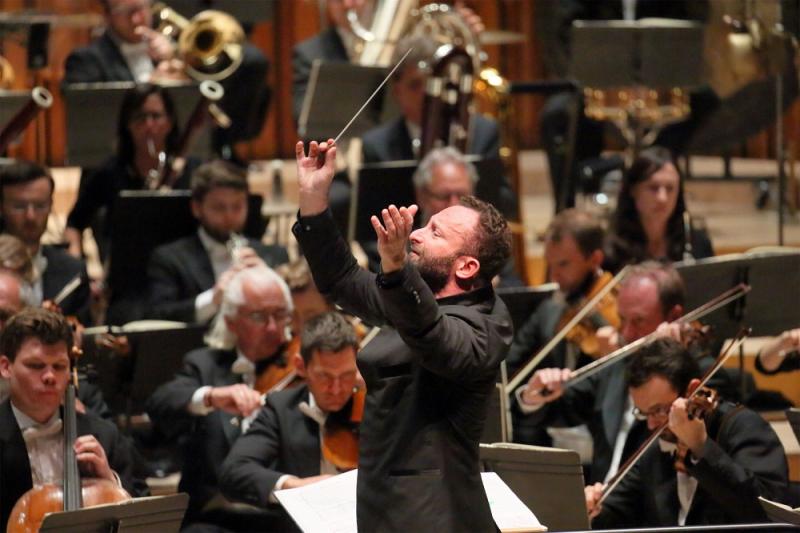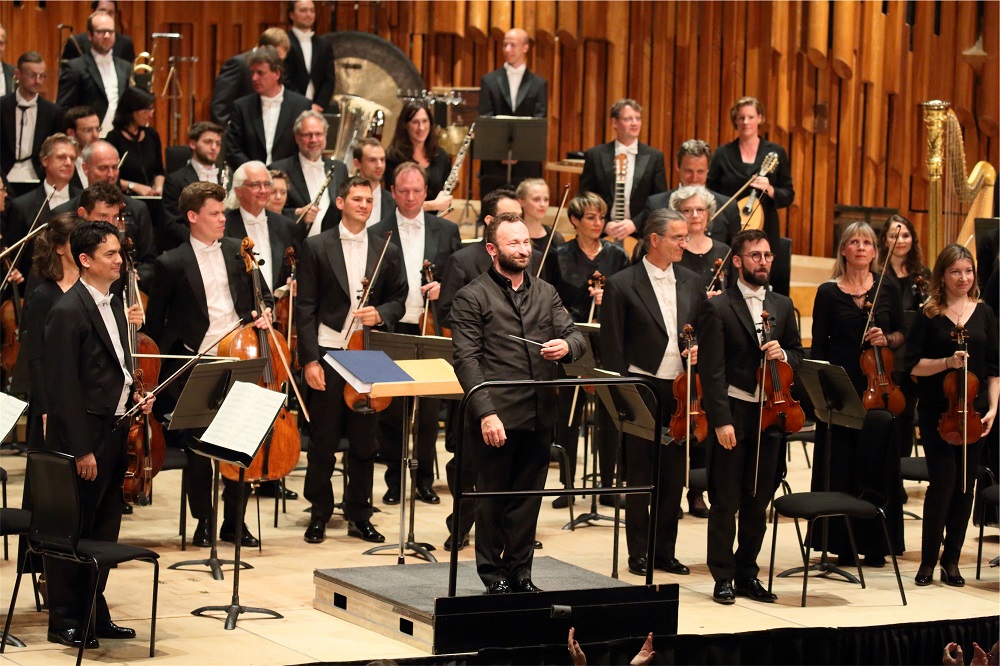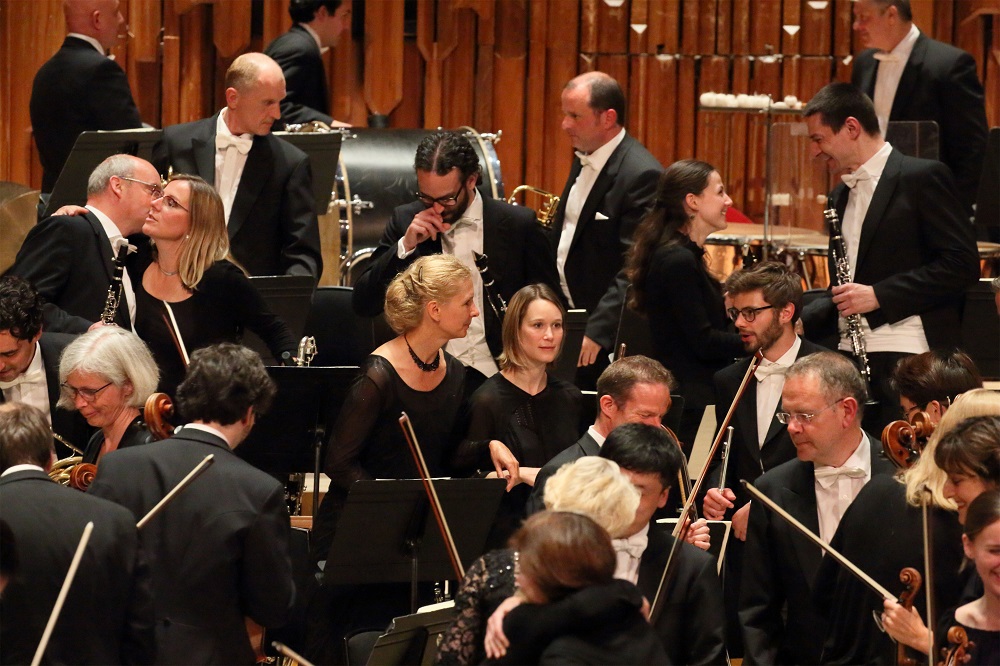Bavarian State Orchestra, Kirill Petrenko, Barbican review - Mahler's Seventh as dance suite | reviews, news & interviews
Bavarian State Orchestra, Kirill Petrenko, Barbican review - Mahler's Seventh as dance suite
Bavarian State Orchestra, Kirill Petrenko, Barbican review - Mahler's Seventh as dance suite
The febrile master bound for Berlin makes life-enhancing magic with his Müncheners

Serendipity as well as luxury saw to it that the night after Simon Rattle gave his farewell Festival Hall performance as music director of the Berlin Philharmonic, his imminent successor appeared over at the Barbican with another excellent German orchestra.
As the symphony which exposes every orchestral department and soloist more relentlessly than any of the others, it doesn't allow an under-prepared performance, and I've never heard one either live or on disc. Rattle's Birmingham performance was my Building a Library choice on BBC Radio 3 back in the 1990s; his Berlin Prom proved the finest thing he's ever done with the orchestra, in this country, at least. Petrenko well knows that Mariss Jansons, his opposite number over at the Bavarian Radio Symphony Orchestra (this, to be clear, is the orchestra of the Bavarian State Opera), has also made the Seventh a vivid cornerstone of his repertoire. But he has ideas of his own, and how he gets this other great Munich band to execute them.  It seemed at first as if there might even be an element of abstraction in the rather springy treatment, once past the baleful tenor-horn led opening, of the first movement's night march with flaming torches. The intention seemed clear: to make a dance suite out of a five-movement symphony harking back to Bach, and maybe also looking across to Tchaikovsky's experiments in the genre. But how evocatively, with spine-tinglingly precise trumpet fanfares, did Petrenko and his orchestra lead us into the central nocturne by masterly degrees; how quickly they plunged us back into the hurly-burly, and how ineffably he hit the biggest climax before the tumultuous coda.
It seemed at first as if there might even be an element of abstraction in the rather springy treatment, once past the baleful tenor-horn led opening, of the first movement's night march with flaming torches. The intention seemed clear: to make a dance suite out of a five-movement symphony harking back to Bach, and maybe also looking across to Tchaikovsky's experiments in the genre. But how evocatively, with spine-tinglingly precise trumpet fanfares, did Petrenko and his orchestra lead us into the central nocturne by masterly degrees; how quickly they plunged us back into the hurly-burly, and how ineffably he hit the biggest climax before the tumultuous coda.
His rapport with chuntering clarinets in the first "night music" movement could be laugh-out-loud funny, with no stitches dropped as we moved seamlessly into a Schubert melody and the central melancholy, wistfully inflected with klezmer strains. The groans and screams of Haunted Ballroom Central at midnight were accompanied by a sometimes hectic sense of a very bad waltz-dream; the dawn serenade, that miracle of transition from the nocturnal to the daylight world, also went about its business briskly, guitar and mandolin clear from their position alongside the harps, but with plenty of room for shadows – albeit not the longer ones more doggedly Mahlerian conductors insist upon – and a final laying to rest with the most exquisite, cusp-of-audibility clarinet trills.  There are those who insist that the Meistersinger-on-acid finale, with its not-quite repetitions and tottering carnival floats, is a problem, but Rattle, Abbado and Jansons changed all that, and Petrenko gave us the most incisive, spirited performance of it you’ll ever hear. Again, the playful, dancing rapport between the balletic but never self-indulgent conductor and his orchestra, strings lurching and pirouetting, could not have been more enjoyable to watch; the trumpets on the high wire never split, and the final welcoming of the night-processional theme into the fold seemed utterly convincing.
There are those who insist that the Meistersinger-on-acid finale, with its not-quite repetitions and tottering carnival floats, is a problem, but Rattle, Abbado and Jansons changed all that, and Petrenko gave us the most incisive, spirited performance of it you’ll ever hear. Again, the playful, dancing rapport between the balletic but never self-indulgent conductor and his orchestra, strings lurching and pirouetting, could not have been more enjoyable to watch; the trumpets on the high wire never split, and the final welcoming of the night-processional theme into the fold seemed utterly convincing.
Given the energy that galvanised us and the players, footstamping their approval at the end (pictured above, the players congratulating each other after the final bow), it might have been fun to get the Prelude to Wagner’s comedy as an encore, but there will be time enough for all that, not least at the Bavarian State Opera, and Petrenko’s visits to the Proms with the Berlin Philharmonic absolutely can’t be missed.
- Kirill Petrenko and the Berlin Philharmonic's two BBC Proms programmes are on 1 and 2 September
- Read more classical music reviews on theartsdesk
rating
Explore topics
Share this article
The future of Arts Journalism
You can stop theartsdesk.com closing!
We urgently need financing to survive. Our fundraising drive has thus far raised £49,000 but we need to reach £100,000 or we will be forced to close. Please contribute here: https://gofund.me/c3f6033d
And if you can forward this information to anyone who might assist, we’d be grateful.

Subscribe to theartsdesk.com
Thank you for continuing to read our work on theartsdesk.com. For unlimited access to every article in its entirety, including our archive of more than 15,000 pieces, we're asking for £5 per month or £40 per year. We feel it's a very good deal, and hope you do too.
To take a subscription now simply click here.
And if you're looking for that extra gift for a friend or family member, why not treat them to a theartsdesk.com gift subscription?
more Classical music
 Bizet in 150th anniversary year: rich and rare French offerings from Palazzetto Bru Zane
Specialists in French romantic music unveil a treasure trove both live and on disc
Bizet in 150th anniversary year: rich and rare French offerings from Palazzetto Bru Zane
Specialists in French romantic music unveil a treasure trove both live and on disc
 Scottish Chamber Orchestra, Ibragimova, Queen’s Hall, Edinburgh review - rarities, novelties and drumrolls
A pity the SCO didn't pick a better showcase for a shining guest artist
Scottish Chamber Orchestra, Ibragimova, Queen’s Hall, Edinburgh review - rarities, novelties and drumrolls
A pity the SCO didn't pick a better showcase for a shining guest artist
 Kilsby, Parkes, Sinfonia of London, Wilson, Barbican review - string things zing and sing in expert hands
British masterpieces for strings plus other-worldly tenor and horn - and a muscular rarity
Kilsby, Parkes, Sinfonia of London, Wilson, Barbican review - string things zing and sing in expert hands
British masterpieces for strings plus other-worldly tenor and horn - and a muscular rarity
 From Historical to Hip-Hop, Classically Black Music Festival, Kings Place review - a cluster of impressive stars for the future
From quasi-Mozartian elegance to the gritty humour of a kitchen inspection
From Historical to Hip-Hop, Classically Black Music Festival, Kings Place review - a cluster of impressive stars for the future
From quasi-Mozartian elegance to the gritty humour of a kitchen inspection
 Shibe, LSO, Adès, Barbican review - gaudy and glorious new music alongside serene Sibelius
Adès’s passion makes persuasive case for the music he loves, both new and old
Shibe, LSO, Adès, Barbican review - gaudy and glorious new music alongside serene Sibelius
Adès’s passion makes persuasive case for the music he loves, both new and old
 Anja Mittermüller, Richard Fu, Wigmore Hall review - a glorious hall debut
The Austrian mezzo shines - at the age of 22
Anja Mittermüller, Richard Fu, Wigmore Hall review - a glorious hall debut
The Austrian mezzo shines - at the age of 22
 First Person: clarinettist Oliver Pashley on the new horizons of The Hermes Experiment's latest album
Compositions by members of this unusual quartet feature for the first time
First Person: clarinettist Oliver Pashley on the new horizons of The Hermes Experiment's latest album
Compositions by members of this unusual quartet feature for the first time
 Gesualdo Passione, Les Arts Florissants, Amala Dior Company, Barbican review - inspired collaboration excavates the music's humanity
At times it was like watching an anarchic religious procession
Gesualdo Passione, Les Arts Florissants, Amala Dior Company, Barbican review - inspired collaboration excavates the music's humanity
At times it was like watching an anarchic religious procession
 Classical CDs: Camels, concrete and cabaret
An influential American composer's 90th birthday box, plus British piano concertos and a father-and-son duo
Classical CDs: Camels, concrete and cabaret
An influential American composer's 90th birthday box, plus British piano concertos and a father-and-son duo
 Cockerham, Manchester Camerata, Sheen, Martin Harris Centre, Manchester review - re-enacting the dawn of modernism
Two UK premieres added to three miniatures from a seminal event of January 1914
Cockerham, Manchester Camerata, Sheen, Martin Harris Centre, Manchester review - re-enacting the dawn of modernism
Two UK premieres added to three miniatures from a seminal event of January 1914
 Kempf, Brno Philharmonic, Davies, Bridgewater Hall, Manchester review - European tradition meets American jazz
Bouncing Czechs enjoy their Gershwin and Brubeck alongside Janáček and Dvořák
Kempf, Brno Philharmonic, Davies, Bridgewater Hall, Manchester review - European tradition meets American jazz
Bouncing Czechs enjoy their Gershwin and Brubeck alongside Janáček and Dvořák
 Solomon, OAE, Butt, QEH review - daft Biblical whitewashing with great choruses
Even a top soprano and mezzo can’t make this Handel paean wholly convincing
Solomon, OAE, Butt, QEH review - daft Biblical whitewashing with great choruses
Even a top soprano and mezzo can’t make this Handel paean wholly convincing

Add comment